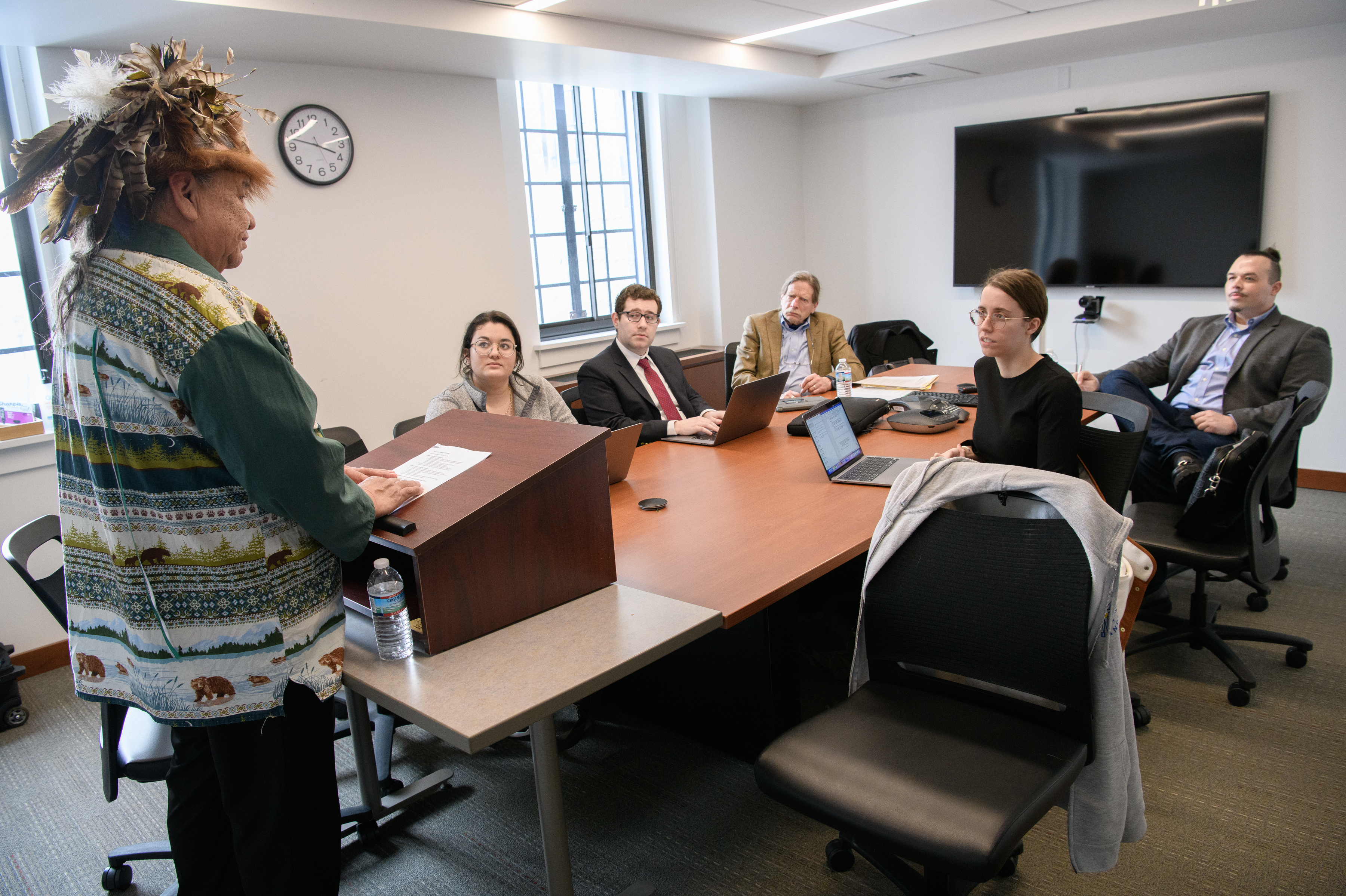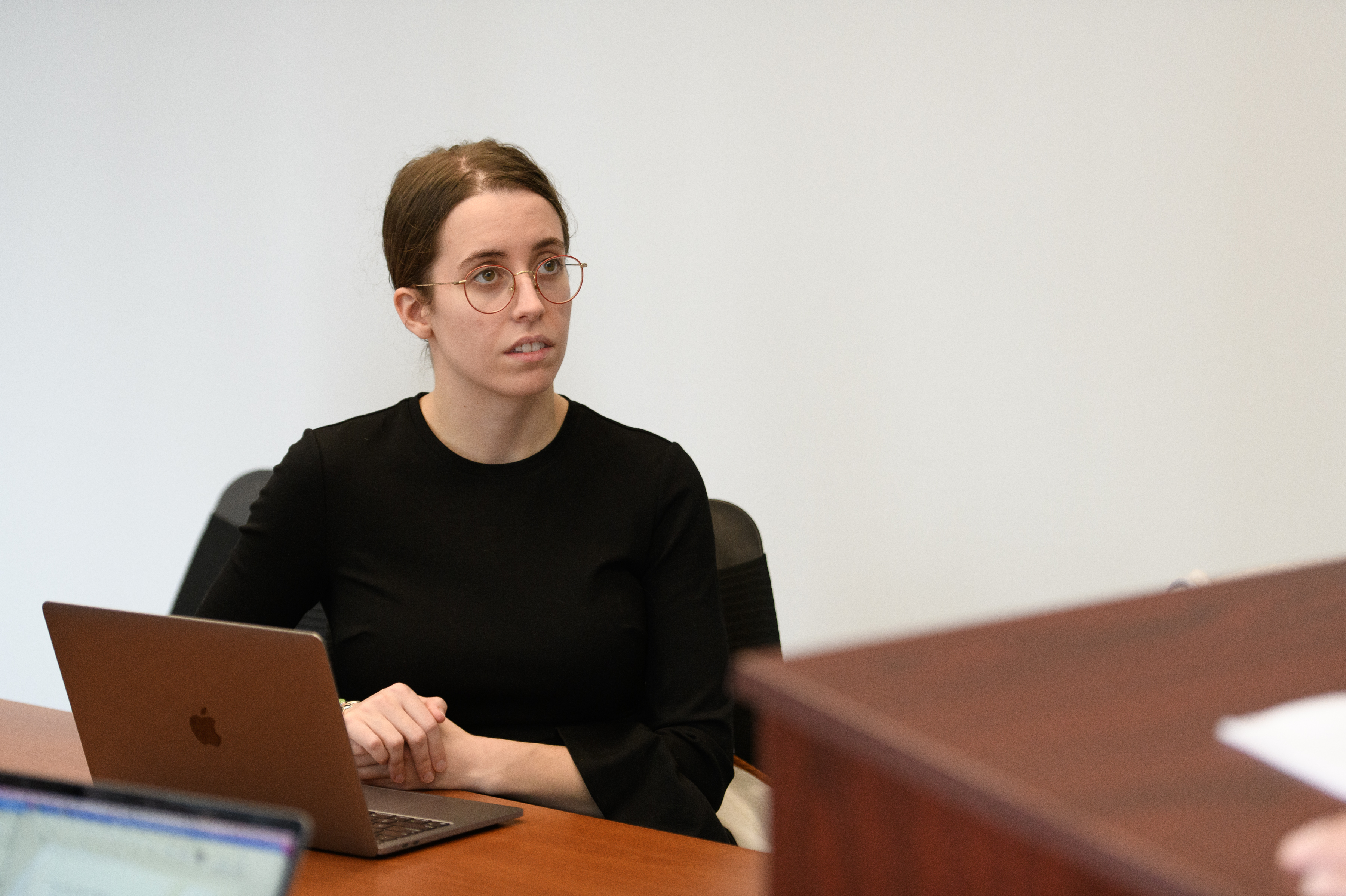This website uses cookies
We use cookies to ensure that we give you the best experience on our website. If you continue to use this site we will assume that you are happy with it.

For hundreds of years, consensus has been the accepted mode of decision-making in the Cayuga Nation. The Clan Mothers and Chiefs debate issues, allow all sides to be heard and come to consensus. That process stands in contrast to the adversarial nature of litigation and majority rule typical of American government. Dealing with that contradiction is the first challenge for law students in the Federal Indian Law Practicum at Cornell Law School.
“We are essentially litigating their right to be consensus-based,” says Danica Murthy ‘24. “It’s not a zero-sum game where someone has to win and someone has to lose. Their goal is to achieve a peaceful method of dispute resolution.” For Murthy, the practicum brings into focus the concept of comity: how to work with different legal systems to achieve due process and fairness.
“That’s the essential struggle we are involved in,” says Joseph “Joe” Heath, adjunct professor, explaining how the law can best be used to help solve long-time societal conflicts and ongoing clashes between tribal traditionalists and a Cayuga government structure that employs Anglo-style tactics enforced by non-Indigenous police and judges. “The work our students are doing has political, social, and cultural components that are, perhaps, even more important than the legal work.”
For example, students have helped prepare briefs involving a tribal conflict over “ownership” of land near Cayuga Lake. Currently, the Cayuga governing body is led by Clint Halftown with the blessing of the federal Bureau of Indian Affairs (BIA). Halftown’s governing body generates significant income by running casinos where alcohol flows freely — a misuse of tribal property, according to the traditionalists.
“Traditionalists stay away from the bottle and from the cards,” says Heath, who also serves as general counsel for the Onondaga Nation. The traditionalists reject Halftown as a legitimate leader because he was not selected by the Clan Mothers, but rather by a survey process that was affirmed by the BIA and not by ancestral tradition. Those traditionalists who oppose Halftown’s leadership have been subject to intimidation, assault, arrest, eviction from their homes and businesses, and destruction of properties they’ve occupied.
“We’ve seen this government commit repeated, widespread violent crimes against its political dissidents, and destroy their property,” says Erin Elliott ‘24. “We have reviewed documents demonstrating how multiple BIA and Department of Interior (DOI) officials knowingly, willfully steamrolled ancient Cayuga governmental structures in favor of a violent government operating completely contrary to Cayuga law. As a student, when you stumble into such flagrant abuses of U.S. federal power and human rights crimes, it is incredibly hard to walk away.”
Michael Sliger JD ’08, adjunct professor and an attorney for tribes and tribal organizations, says the students in the practicum are passionate, committed, and extraordinarily skilled. “They have top notch legal training, and they are using it to do something meaningful for Indigenous peoples’ lives. It’s important that this work gets done, especially given that the university is on Cayuga Nation territory.”

Federal Indian Law (the term “Indian” is a legal descriptive for the Indigenous peoples who lived in North America at the time of European colonization) reconciles an Indigenous tribe or nation’s sovereign authority to govern themselves, subject to overriding federal authority and various federal statutes that deal with Indian rights and governance. “We have dozens of issues we are working on at any given time, and it’s all very high stakes,” says Sliger. “There are some tribal factions that target their citizenship, particularly those that they consider political opposition. Their tactics are brutal—disenrollment, banishment, imprisonment, assault, and constant surveillance. Sovereignty was never meant to be used against your own people, and we cannot turn a blind eye to these injustices.”
“This practicum has taught me, more than anything else in law school or in internships, how to be a lawyer,” says Elliott. “It has a pretty rigorous writing component, and the professors are very detail-oriented; they treat students like law firm associates. They are excellent coaches that demand your best and provide every tool in helping you reach your potential as a writer and legal researcher.”
“Every single law student should study Federal Indian Law,” says Katlin Bowers ’23, who is pursuing a career in corporate law and is now a law clerk in the New York City office of Debevoise & Plimpton. Bowers took all relevant classes available at Cornell and two semesters of the practicum. “There’s an intersection of issues that creates a well-rounded legal education, from business law and its application to casinos, to property law and its application to evictions, to constitutional law and its application to sovereignty rights, to human rights and the relationships between federal, state governments, and tribal governments.”
Bowers grew up in Anchorage, Alaska, and is a tribal citizen of the Cherokee nation. She felt deeply connected to that tribal community, but her studies in law school opened her eyes to the expansive nature of tribal law. “There are 574 federally recognized tribes,” says Bowers. “Tribal law is not a monolith; the tribes have disagreements on how their communities should be run. Some are more modernist. Some are more traditionalist. I gained a deep understanding and appreciation for the diversity of traditions and tribal law and how the issues intersect with corporate law.”
In fact, it’s the interdisciplinary nature of the work that most intrigues Murthy. “In law school, the coursework is often focused on one subject at a time—there’s tort law, property law, constitutional law. In Federal Indian law, many issues are interconnected—criminal and civil issues, cultural heritage, and preservation issues. I remember in my first semester when we were dealing with some of the eviction cases, I was doing research and came across a statute that could be used to find the eviction illegal because there was no signed lease. But Professor Heath reminded me that this kind of argument could hurt our clients in the long run because not all Native communities traditionally write leases. When developing a legal strategy, we shouldn’t impose our own American cultural values and norms onto our clients.”
Perhaps nowhere is this cultural divide more evident than in the legal fight over the placement of a statue in Columbus Circle in downtown Syracuse. The Christopher Columbus statue, installed in 1934, is a flashpoint for those representing the civil and human rights of Indigenous peoples. The law students worked on an amicus brief to support the Onondaga Nation in its efforts to get the statute removed.
“Not only is the statue of Columbus standing atop the disembodied heads of Indigenous chiefs while naked Indigenous peoples bowed at his feet on lower panels, but that statue was built on land that is still part of the Onondaga Reservation under the 1794 Treaty of Canandaigua,” says Elliott. “The implication here is that Indigenous people are suffering insult to injury. The practicum aims to offer aid to both the legal and cultural degradation of Indigenous tribes.”
“The human rights issues we deal with in the practicum are real, and they’re current,” echoes Murthy. They are also relevant to many other areas of the law—from the rights of incarcerated prisoners to questions of voting rights and government overstep. The practicum provides a valuable platform for legal work that is complex and comprehensive, requiring fortitude and patience. The students and faculty celebrate small legal victories along the way and draw inspiration from their clients.
“The Onondaga never give up,” says Heath. “Our clients are great teachers in resilience. It’s almost as if adversity gives them strength.”
“It’s easy to get bogged down in legal issues,” says Murthy. “Then you meet the Chiefs and the citizens and realize these are not abstract issues. The law is a tool to help people. We’ve had some wins, and as long as we can keep moving forward, we’re still moving.”